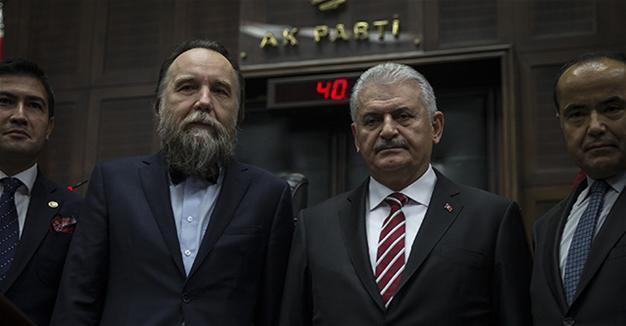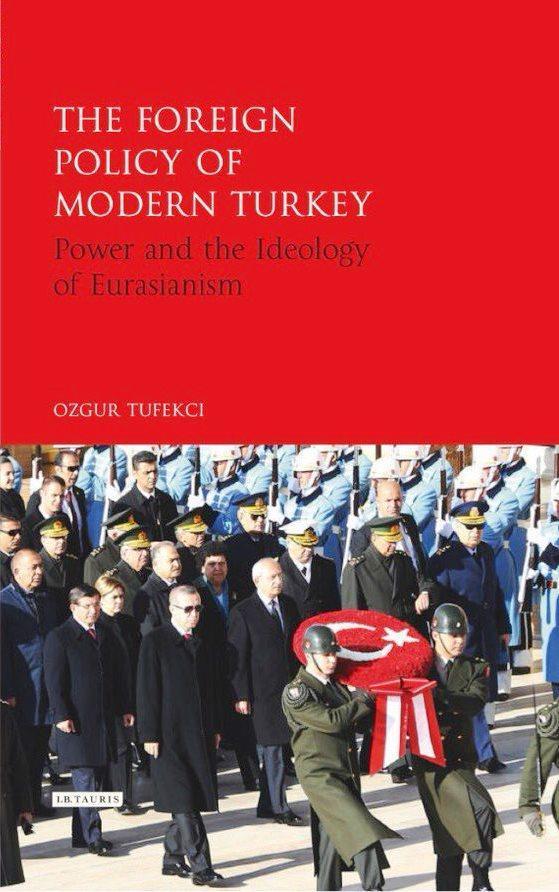Eurasianism in modern Turkey
William Armstrong - william.armstrong@hdn.com.tr

Russian strategist Alexander Dugin (2nd left) stands alongside Turkish PM Binali Yıldırım at a ruling Justice and Development Party (AKP) meeting at the Turkish Parliament in Ankara in Nov. 8, 2016.
‘The Foreign Policy of Modern Turkey: Power and the Ideology of Eurasianism’ by Özgür Tüfekçi (IB Tauris, 242 pages, $94)
Turkey’s Western orientation is sometimes seen purely as a result of reforms pushed by Mustafa Kemal Atatürk in the early Turkish Republic. The aim of the modernizing and secularizing nationalist project was to “bring Turkey to the level of contemporary civilization.” But westernization was a process that started long before, during the late Ottoman period. What’s more, Turkey only really became institutionally embedded in the West with the start of the Cold War, joining NATO in February 1952.
With the collapse of the Soviet Union in 1991, the question of Turkey’s strategic orientation reemerged. The 1990s are often remembered elsewhere for seeing the triumph of the Western model, but in Turkey other ideologies that had been bubbling under the surface also started to emerge after the end of the Cold War: Neo-Ottomanism, Neo-Islamism, and Neo-Eurasianism. “The Foreign Policy of Modern Turkey: Power and the Ideology of Eurasianism” by Black Sea Technical University associate professor Özgür Tüfekçi is an informative account of the latter.

Eurasianism - broadly encompassing the idea that Turkey should reorient away from the West in favor of an Eastern and Central Asian hinterland - remains a significant strand of thinking. After the July 2016 coup attempt, there are reports that anti-American neo-Eurasianists are
filling vacated positions in state institutions, along with Islamists and ruling Justice and Development Party (AKP) partisans. So it is certainly worth brushing up on the development of Eurasianism in Turkey.
Tüfekçi looks back to Russia almost a century ago to trace the origins of Eurasianist thinking. The original Eurasianists were largely Russian nationalist emigres from the Soviet Union, who developed a theory imagining Russia as a distinct spiritual civilization going back to the pre-modern steppes of Central Asia, fundamentally incompatible with modern ideologies that developed in the West, including communism.
Turkish variations on Eurasianist thinking echoed in fusty corners of Turkish intelligentsia through the 20th century. But what Tüfekçi calls “neo-Eurasianism” only started making inroads in the 1990s, partly chiming with the initiatives of President Turgut Özal. Özal was keen to develop relations with newly independent Turkic states in Central Asia, with Turkey playing a “big brother” role. Ankara wanted to create a new sphere of influence by establishing road, energy and communications links. But its moves in Central Asia came to little, limited by the suspicions of powers like Russia and Iran, as well as the jealously independent new states themselves.
Today, Eurasianism in Turkey most commonly refers to the line pushed by Vatan (Homeland) Party leader Doğu Perinçek. Perinçek has been a limpet-like fixture in Turkish politics for decades, pushing an anti-Atlantic, pro-Russia, Turkish nationalist agenda with a superficial overlay of left-wing symbolism. This today dovetails neatly with the neo-Eurasianism of Alexander Dugin. A spectacularly bearded Russian ideologue, Dugin is said to be carrying out state duties in touch with Putin. His bombastic anti-liberal and cod-spiritual historical theories focus on destroying NATO, combating the EU, and cultivating a multipolar system based on supposed historic spheres of influence. Dugin and Perinçek have been in contact in recent years, and Dugin has also
attended ruling AKP assemblies. He is even said to have played
a key role in patching up Russia’s relations with Turkey after the latter’s downing of a Russian jet in November 2015. Despite lingering suspicion between Moscow and Ankara, Dugin sees an opportunity to peel Turkey away from the Western alliance.
The detached scholarly tone of “Power and the Ideology of Eurasianism” is sometimes problematic. Many of the
tin-foil hat ideas it looks at really should have been buried with other fascist-friendly fantasies in the early 20th century. Tüfekçi’s straight-faced presentation treats them with more respect than they deserve. The book sometimes refers to the contradictions and historical tendentiousness of various strands of Eurasianism, but it does not go far enough. Still, there is plenty to learn from it, as the perennial question of Turkey’s strategic axis continues to be posed.
* Follow the Turkey Book Talk podcast via iTunes here, Stitcher here, Podbean here, or Facebook here.

 Eurasianism - broadly encompassing the idea that Turkey should reorient away from the West in favor of an Eastern and Central Asian hinterland - remains a significant strand of thinking. After the July 2016 coup attempt, there are reports that anti-American neo-Eurasianists are filling vacated positions in state institutions, along with Islamists and ruling Justice and Development Party (AKP) partisans. So it is certainly worth brushing up on the development of Eurasianism in Turkey.
Eurasianism - broadly encompassing the idea that Turkey should reorient away from the West in favor of an Eastern and Central Asian hinterland - remains a significant strand of thinking. After the July 2016 coup attempt, there are reports that anti-American neo-Eurasianists are filling vacated positions in state institutions, along with Islamists and ruling Justice and Development Party (AKP) partisans. So it is certainly worth brushing up on the development of Eurasianism in Turkey.